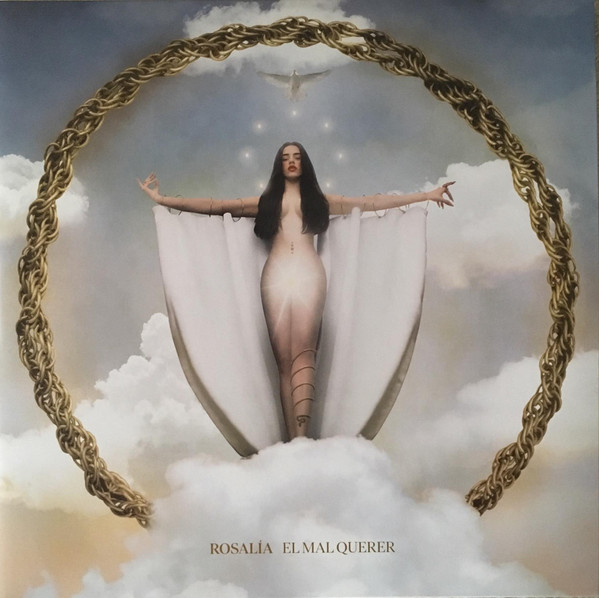Spanish singer-songwriter Rosalía is now widely known for her recent musical release, “Motomami”, released in March 2022 and for previous releases featuring Travis Scott and latin sensation J Balvin. However, the 30-year-old Spanish singer was first internationally recognized following the release of her second album under Sony music, “El Mal Querer”.
In “El Mal Querer”, the singer has created an electric world of acoustic instruments working together to create one glorious symphony. “El Mal Querer” translates to ‘the bad loving,’ an accurate description of the themes within the album.
The album was an experimental and conceptual record inspired by the book “Flamenca”, written in the 13th century. “Flamenca” focuses its plot on a troubadour courtly love about a man who keeps a woman locked in a tower. Every song on the album serves as a chapter from the book, and the album follows the narrative of the plot.
“El Mal Querer” begins with “Malamente”, a record with sounds of hand clapping and heavy synth serving as the background instrumental. Despite it being one of the more pop-friendly records on the album, Rosalía makes it folkier with the ad-libs she adds in the background as the song progresses.
After “Malamente” comes “Que No Salga La Luna”, which begins with the heavy strumming of an acoustic guitar and Rosalía’s ties to her Catalan roots. There is a catchy 808 against rhythmic hand clapping as she sings in a style typically seen in Andalusian flamenco songs.
This far in the story, the singer covers how the protagonist in the album has a shimmering wedding full of bright diamonds, crystals, and pearls. It is meant to represent a deceivingly beautiful romance, however, not all that shines is gold as we soon come to realize.
“Piensa En Tu Mirá” covers the next chapter in the story, titled jealousy. This song presents itself as pop, but to keep with the consistent style seen throughout the rest of the album, Rosalía replaces hand claps with beats that serve as the background of the song.
“I think you will never come back, and if I don’t hold you tight, I feel it will be my fault,” she sings while relaying the feelings of a jealous lover who fears losing their partner.
Her voice is fat and rich with intensity, while her harmonies remain low. She piles her harmonies on top of one another and as the song reaches the climax, a group of children serve as the ad-libs.
After jealousy comes dispute where Rosalía sings about the protagonist fighting with their lover. The story is melodramatic and thus far, each song has been full of rhythmic hand clapping and experimentation with her vocals and heavy autotune.
The song is titled “De Aqui No Sales”, which translates to ‘from here, you won’t get out,’ and it alludes to the story within Flamenca. At this point in the album’s narrative, the protagonist is trapped, with nowhere to turn.
Although the song is pared-down instrumentation of flamenco, her emotion is stapled to the song. She sings with intensity and drama that etches into the lyrics she sings.
The song transitions into “Reniego”, which begins with a chorus of string instruments. This is chapter 5, titled lament. Again, the singer experiments with autotune and harmonies, as well as with a singing style heard in flamenco songs.
She sings, “And for more pities, for more little pities, of this sorrow of mine,” and finishes with, “I resent my fate…ay, the hour I met you.” Her vocals are rich and theatrical. In this story, Rosalía is merely the narrator.
In lament, the protagonist resents their lover and mourns the love they once believed to be beautiful.
Chapter 6 is closure, a song that is only 40 seconds long. The lyrics detail how because of love, the protagonist “fell to hell” and then “rose with two angels” and they only now question the pain.
“Bagdad” is the seventh song on the record and it is titled after a famous nightclub in Spain. It represents the drama that unfolds throughout the rest of the album. Rosalía’s sopranos are elastic, electric, agile, and full of the agony representing this tumultuous love story.
The song is followed by the traditional sounding “Di Mi Nombre” and afterwards comes “Nana”, the dreamy record laced with heavy autotuned harmonies and the sound of rain.
“And sad rain falls, to see you you, behind every droplet an angel sees you,” her voice becomes a melodic choir, with a new recording of her voice being added on as the seconds pass.
Chapter 10 is “Maldicion”, which translates to curse. Here, Rosalía explains how the protagonist wishes to escape despite being told there is no exit. “I gotta find it, even if it costs my life,” she sings.
However, rather poetically, at the end of the song Rosalía declares, “In a moment I would want to be insane and not love, because loving causes sorrow, sorrow that has no end, and the insane live without it.”
To close the album, Rosalía sings about the damage done to the protagonist in “A Ningun Hombre” where, through throaty vocals, she proclaims, “I’ll tattoo your initials onto my skin, to remember forever, of all you did one day.”
Rosalía’s second studio album is a masterful mix of flamenco instrumentals, heavy sopranos, and a narrative of melodramatic and sorrowful love. With every agile sprint of angular harmonies, the Spanish singer paints an adventurous, deceptively pretty and graceful world where love takes a turn for the worse.
It’s tense, passionate, and a beautiful work of creativity.

